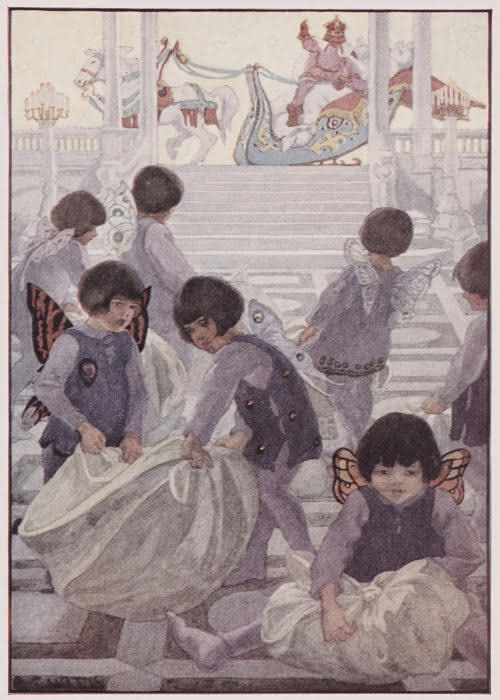I recently undertook a project to re-print the illustrated stories from Mary Graham Bonner’s 1923 children’s collection, 365 Bedtime Stories. Her book contains one bedtime story for each day, and sixteen have full color illustrations by Florence Choate and Elizabeth Curtis. The second illustrated story from the collection is February 6’s In Dreamland. Below, we re-print In Dreamland along with its original accompanying illustration by Elizabeth Curtis.
(Note: The illustration is unsigned, but I think the illustrator here is Curtis.)
Reprinting February 6 – “In Dreamland”
“We’ve got lots of work to do to-night,” said the Dream King, and the Dream Fairies said, “What have we to do?”
“Well,” said the Dream King, “in talking to the Fairy Queen this afternoon, she said that she had quite a lot to tell me and she looked very sad.
“It seems that there have been many children lately she has heard telling each other unkind things they have heard about each other.
“For instance, she heard one little girl say to another little girl, ‘Oh, Sally, I heard Mamie say she thought you were awfully mean and selfish. I told her I didn’t think so. I stood up for you. I was your friend.’
“Well, the Fairy Queen said that made her mad. She said it was far worse of the little girl who came and told such a horrid thing than it even was in the little girl who had said it.
“I am going to give dreams to lots and lots of children who have said mean things. I am going to show them a huge room full of children and all the children will be crying and sobbing, and there won’t be enough handkerchiefs to go around.
“And I will tell them that these children are crying because of the mean speeches they have heard repeated.
“Hurry, Dream Fairies, tie up the dreams for me to take around. You know what I want now.

“And, Dream Fairies,” continued the Dream King, “I’m going to tell each girl and boy how every mean speech she or he thinks of and doesn’t make, or doesn’t repeat, will come straight to Dreamland and every week we will have a great big bonfire of them. Then all the Dream Fairies will laugh and sing as the mean speeches are burnt up.”
Analysis
The first story I covered for this project concerned a father telling his daughter a lovely story of how another girl took good care of her beloved canary. In Dreamland addresses a more sinister category of story sharing, gossip. In particular, its moral is that if a child hears someone say something nasty about another child, he or she need not relay the message. The Fairy Queen relayed a case to the Dream King wherein an unnamed girl heard a girl named Mamie say something unkind about a certain Sally and rushed to tell Sally, but not before having defended Sally in the moment by her own account. While the girl portrayed herself as being virtuous for having told Sally the saga and how she stood up for Sally, the Fairy Queen was less than convinced according to the Dream King:
Well, the Fairy Queen said that made her mad. She said it was far worse of the little girl who came and told such a horrid thing than it even was in the little girl who had said it.
Dream King
This is a strong take. It was worse of the girl to relay the mean thing that Mamie had said about Sally than it was for Mamie to have slandered Sally in the first place. Surely, the Fairy Queen would not have frowned upon the girl defending Sally (if she did in fact defend Sally), but she saw no reason for the girl to tell Sally about what Mamie had said.
(One may consider this a cautionary story with respect to my specious theory that an act of heroism must always be trumpeted.)
Bonner delivers the moral in a clever way. The children, boys and girls, who retold bad things they had heard to those who the bad things were said about would be given bad dreams wherein they would be in a room with crying and sobbing children. It would be made clear to the boy or girl having the bad dream that the crying and sobbing children were in that state “because of the mean speeches they have heard repeated.”
Our lesson here is that it is bad enough for mean things to be said at all, but not every mean thing needs to be amplified. Assuming arguendo that the girl who had repeated what Mamie had said about Sally to Sally had in fact defended Sally in the moment, she should have been content with the knowledge that she had done the right thing without sharing the story with Sally. In the story’s formulation, her telling Sally what Mamie had said would only serve to make Sally upset. That is surely not worth the girl who had defended Sally being able to make Sally aware of her own impeccable virtue.